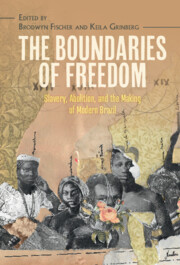Book contents
- The Boundaries of Freedom
- Afro-Latin America
- The Boundaries of Freedom
- Copyright page
- Contents
- Figures
- Tables
- Acknowledgments
- Introduction Slavery and Freedom in Nineteenth-Century Brazil
- Part I Law, Precarity, and Affective Economies during Brazil’s Slave Empire
- Part II Bounded Emancipations
- Part III Racial Silence and Black Intellectual Subjectivities
- Part IV Afterlives of Slavery, Afterwards of Abolition
- 13 The Past Was Black
- 14 From Crias da Casa to Filhos de Criação
- 15 Slave Songs and Racism in the Post-Abolition Americas
- Bibliography
- Index
15 - Slave Songs and Racism in the Post-Abolition Americas
Eduardo das Neves and Bert Williams in Comparative Perspective
from Part IV - Afterlives of Slavery, Afterwards of Abolition
Published online by Cambridge University Press: 10 March 2022
- The Boundaries of Freedom
- Afro-Latin America
- The Boundaries of Freedom
- Copyright page
- Contents
- Figures
- Tables
- Acknowledgments
- Introduction Slavery and Freedom in Nineteenth-Century Brazil
- Part I Law, Precarity, and Affective Economies during Brazil’s Slave Empire
- Part II Bounded Emancipations
- Part III Racial Silence and Black Intellectual Subjectivities
- Part IV Afterlives of Slavery, Afterwards of Abolition
- 13 The Past Was Black
- 14 From Crias da Casa to Filhos de Criação
- 15 Slave Songs and Racism in the Post-Abolition Americas
- Bibliography
- Index
Summary
Slave songs – understood here as songs, dances, movements, and genres developed by the enslaved – profoundly marked the history of conflict and cultural dialogue in slave and post-slavery societies across the Americas. This chapter investigates belle époque slave song performance by focusing on two Black musicians, Eduardo das Neves (1874–1919) and Bert Williams (1874–1922). Their stories demonstrate that the musical field occupied a fundamental space within the politics of Afro-descendant representation, exclusion, and incorporation (real or imagined). Representations of Black people and the meanings attributed to their music could shore up the racial inequalities that reproduced themselves after the end of slavery, but they could also subversively amplify Black struggles for equality and cultural recognition.
Keywords
- Type
- Chapter
- Information
- The Boundaries of FreedomSlavery, Abolition, and the Making of Modern Brazil, pp. 388 - 419Publisher: Cambridge University PressPrint publication year: 2022



